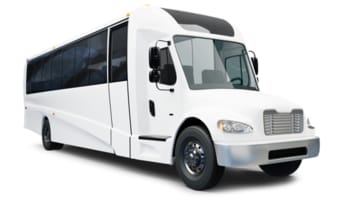Bus rentals for K-12 field trips in Houston
As a Houston educator, you know field trips can transform your students’ educational experience — take them there with Bus.com

In Houston, it can often feel like the dog days of summer are yearlong. However, this doesn’t have to be true for your students. Teachers know the value of a field trip, timed just-so. Houston boasts a rich diversity of museums, gardens, and other hands-on experiential learning experiences. Although the city is very busy, field trips can be a cinch, with a charter bus rental from Bus.com.
cost-effectively
enhancements
Customer Support
Which vehicle is right for my group?
A word about the benefits of field trips
As an educator, you understand the importance of hands-on learning for students. By their very nature, field trips do this. When students are at an offsite location, they’re usually able to take more ownership over their learning.
- Traveling on a charter bus allows your students to connect with you, other adults, and each other.
- Travel time provides opportunities to review what they’ve learned, and to connect socially.
- Field trips also increase critical thinking skills.
- Field trips also spread knowledge and encourage historical empathy.
Bus.com is trusted by companies big and small












Field trip ideas in Houston
In Houston there are so many amazing resources for educators, especially those who want to take their students on a field trip. We’ve gathered some of the best field trip options around here in one place for you so that you can save a little bit of time in the pre-work.
Houston Zoo
The Houston Zoo is a 55-acre zoo with over 6,000 permanent animals. It sees roughly 2 million visitors per year. Through admission sales, they are able to support 49 conservation efforts around the world.
In addition to your standard animal exhibits, the zoo also has a giraffe feeding platform, a water play park, and a wildlife carousel! If you’re going to attend the Houston Zoo, you want to make sure you fill out a reservation form at the earliest possible date. Ticket prices range from $12-$15 and there is a processing fee of $20 for each order. Some schools may qualify for free admission.
Houston Museum of Natural Science
The Houston Museum of Natural Science is located at the northern section of Hermann Park in Houston. For field trips, admission is $4 per child. There are 12 themed field trips for educators to choose from, if you’d like a larger package that includes films and special labs. These themed options do have an additional cost.
Initially, the museum was built to provide a free museum that focused on science and education. The museum honors this history by allowing free admittance to permanent exhibits on Thursdays from 2-5 pm. In addition to permanent exhibits, the museum also has a planetarium, a butterfly center, and satellite facilities like HMNS at Sugarland.
Children’s Museum of Houston
The Children’s Museum of Houston is a premier hands-on facility for your students. All of their exhibits are aligned with TEKS (Texas Essential Knowledge and Skills) standards, making it an ideal field trip location. They have experiences that focus on English and reading, fine arts, mathematics, physical education, science, and social studies.
Students can bring their lunches or find nutritious meals in their Fresh Café. The museum was founded in 1980, with a focus on early childhood education, and over the years has grown. Today the facility has over 90,000 sq feet of exhibits and also has a branch of the public library on its campus.
Museum of Fine Arts
The Museum of Fine Arts, Houston, was established in 1900 and is one of the largest art museums in the United States. Its permanent collection contains 63,718 pieces in 300,000 square feet, across seven different buildings. General admission is free for anyone who is age 12 or younger. However for field trips, there is no charge.
The museum offers both self-guided visits and facilitated tours for classes. They also have a bus transportation fund that offers bus scholarships of up to $250. If you’re interested in American decorative arts and paintings, make sure to check out the Bayou Bend Collection and Gardens, which is located on 14 acres of maintained gardens.
Health Museum
The Health Museum, has been around since 1969, in some form or other. Their mission: to foster wonder and curiosity about health, medicine science, and the human body. In 2017, the museum became a Smithsonian Institute Museum, which provides extra resources and educational opportunities.
Field trip admission is $8 per student and allows access to all exhibits and free flow activities. If your students want to participate in the DeBakey Cell Lab, it will be an extra $5. The lab is the only bilingual science lab museum exhibit in the country and features seven biology-based science experiments that your students can participate in.







